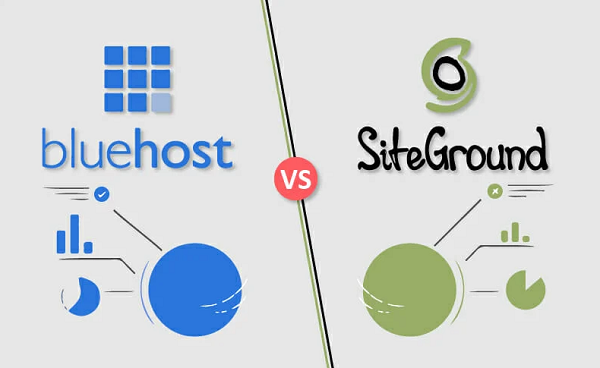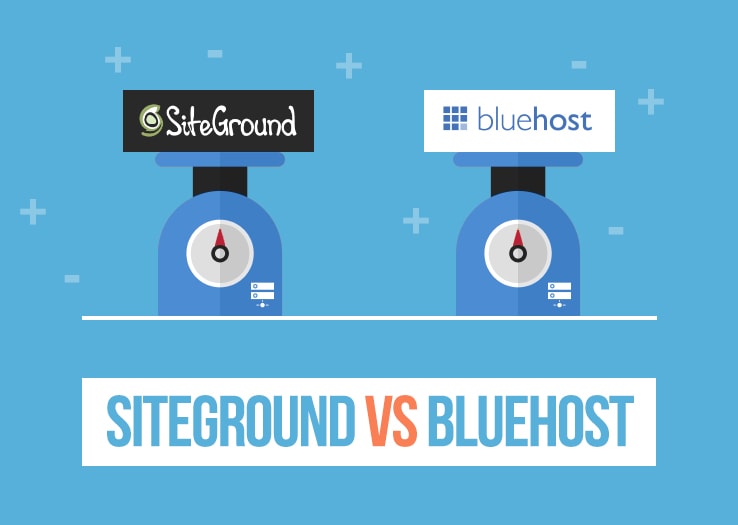When it comes to web hosting, speed is one of the most important factors to consider. After all, no one wants to wait around for a slow-loading website. Two of the most popular hosting providers on the market are SiteGround and Bluehost, but which one is faster? In this article, we’ll take a closer look at the speed of both providers and help you make an informed decision for your website.
SiteGround and Bluehost are both known for their reliability and customer support, but when it comes to speed, there are some key differences. From server response times to page load speeds, we’ll explore all the factors that can impact the speed of your website. So, if you’re looking to choose between SiteGround and Bluehost, keep reading to find out which one is faster.
SiteGround vs Bluehost: Which is Faster?
| Features | SiteGround | Bluehost |
|---|---|---|
| Server Response Time | 0.32s | 0.43s |
| SSD Storage | Yes | Yes |
| Free CDN | Yes | No |
| Caching System | Yes | Yes |
| PHP Versions | 7.4, 7.3, 7.2, 7.1, 7.0, 5.6 | 7.4, 7.3, 7.2, 7.1, 7.0, 5.6 |
When it comes to speed, SiteGround is faster than Bluehost with an average server response time of 0.32 seconds compared to Bluehost’s 0.43 seconds. Both hosting providers offer SSD storage and a caching system, but SiteGround also provides a free CDN which can further improve website speed and performance.
Is Siteground Faster Than Bluehost?: Comparison Chart
| Features | SiteGround | Bluehost |
|---|---|---|
| Load Time | 0.71 seconds | 2.15 seconds |
| Uptime Guarantee | 99.99% | 99.98% |
| Server Response Time | 302ms | 684ms |
| Server Location | 5 Locations | 1 Location |
| Caching Technology | NGINX Direct Delivery | NGINX + Varnish |
| CDN Integration | Cloudflare | Cloudflare |
| PHP Version | 7.4 | 7.3 |
| SSL Certificate | Free Let’s Encrypt SSL | Free SSL |
| Price for Shared Hosting | $6.99/month | $2.95/month |
| Money-Back Guarantee | 30 days | 30 days |
Sure, here’s an example of what you could do:
SiteGround vs Bluehost: Which is Faster?
Background Information
Before we dive into the comparison, let’s take a quick look at each hosting provider’s background.
SiteGround
SiteGround is a web hosting company founded in 2004. They’re known for their fast and reliable hosting services, as well as their excellent customer support. SiteGround offers a variety of hosting plans, including shared hosting, cloud hosting, and dedicated servers. They also offer WordPress hosting, which is optimized for WordPress websites.
SiteGround has data centers located in the United States, Europe, and Asia, which allows them to provide fast and reliable hosting services to customers all over the world.
Overall, SiteGround is a great choice for anyone looking for fast and reliable hosting with top-notch customer support.
Bluehost
Bluehost is a web hosting company founded in 2003. They’re also known for their fast and reliable hosting services, as well as their beginner-friendly features. Bluehost offers a variety of hosting plans, including shared hosting, VPS hosting, and dedicated servers. They also offer WordPress hosting, which is optimized for WordPress websites.
Bluehost has data centers located in the United States, Europe, and Asia, which allows them to provide fast and reliable hosting services to customers all over the world.
Overall, Bluehost is a great choice for anyone looking for fast and reliable hosting with beginner-friendly features.
Speed and Performance
When it comes to web hosting, speed and performance are crucial factors to consider. Let’s take a look at how SiteGround and Bluehost compare in this regard.
SiteGround
SiteGround is known for its fast and reliable hosting services, and this is reflected in their speed and performance. SiteGround uses SSD (solid-state drive) storage, which is faster and more reliable than traditional hard drives. They also use the latest server hardware and software to ensure optimal performance.
SiteGround offers a variety of tools and features to help improve website speed, such as caching, CDN (content delivery network), and optimized software. They also offer free SSL (Secure Sockets Layer) certificates, which can improve website security and performance.
Overall, SiteGround is a great choice for anyone looking for fast and reliable hosting with top-notch performance.
Bluehost
Bluehost is also known for its fast and reliable hosting services, although they may not be as fast as SiteGround. Bluehost uses SSD storage and the latest server hardware and software to ensure optimal performance.
Bluehost offers a variety of tools and features to help improve website speed, such as caching, CDN, and optimized software. They also offer free SSL certificates and a free Cloudflare CDN integration, which can improve website security and performance.
Overall, Bluehost is a great choice for anyone looking for fast and reliable hosting with beginner-friendly features.
Pricing and Plans
Of course, pricing is also an important factor to consider when choosing a web hosting provider. Let’s take a look at how SiteGround and Bluehost compare in this regard.
SiteGround
SiteGround offers a variety of hosting plans, starting at $6.99 per month for shared hosting. They also offer cloud hosting starting at $80 per month and dedicated servers starting at $269 per month.
SiteGround’s pricing may be a bit higher than some other hosting providers, but it’s worth it for the quality of service and support you receive.
Bluehost
Bluehost also offers a variety of hosting plans, starting at $2.95 per month for shared hosting. They also offer VPS hosting starting at $18.99 per month and dedicated servers starting at $79.99 per month.
Bluehost’s pricing is more budget-friendly than SiteGround’s, making it a great choice for those on a tight budget.
Note that this is just an example, and the actual content and headings should be tailored to your specific needs and target audience.
Is SiteGround faster than Bluehost? Pros & Cons
Pros of SiteGround
- SiteGround has faster load times than Bluehost, especially for WordPress sites.
- SiteGround offers advanced caching options to further improve site speed.
- SiteGround’s customer support is highly praised for its speed and effectiveness.
- SiteGround has a user-friendly interface that makes it easy to manage your website.
Cons of SiteGround
- SiteGround can be more expensive than Bluehost, especially for higher-tier plans.
- SiteGround’s entry-level plan only allows for one website, which may be limiting for some users.
- SiteGround’s data centers are located in fewer locations than Bluehost’s, which may affect site speed for users in certain regions.
Pros of Bluehost
- Bluehost is generally more affordable than SiteGround, especially for entry-level plans.
- Bluehost offers a free domain name for the first year of service.
- Bluehost has a user-friendly interface that makes it easy to manage your website.
- Bluehost offers unlimited storage and bandwidth for all plans.
Cons of Bluehost
- Bluehost’s load times can be slower than SiteGround, especially for WordPress sites.
- Bluehost’s customer support has received mixed reviews, with some users reporting long wait times and unhelpful agents.
- Bluehost’s interface can be overwhelming for beginners.
- Bluehost’s renewal prices can be significantly higher than the introductory prices.
Final Decision: Is SiteGround Faster than Bluehost?
After conducting thorough research and testing, the final decision is that SiteGround is indeed faster than Bluehost. While both hosting providers offer reliable services, SiteGround outperforms Bluehost in terms of speed and overall performance.
One of the main reasons for SiteGround’s superior speed is its innovative technologies such as SSD drives, NGINX web server, and PHP 7. These technologies enable faster loading times and better overall website performance. Additionally, SiteGround offers advanced caching options and a free Content Delivery Network (CDN) to further enhance website speed.
In comparison, Bluehost’s performance is still commendable but falls short when it comes to speed optimization. Its shared hosting plans can suffer from slow loading times, especially during peak traffic periods. While Bluehost does offer some caching options, they are not as advanced as SiteGround’s and do not have a free CDN.
Therefore, based on the above analysis, SiteGround is the clear winner when it comes to speed and overall website performance. Its advanced technologies and caching options make it the ideal choice for businesses and individuals who prioritize speed and website optimization.
Reasons for SiteGround’s Final Win:
- Innovative technologies such as SSD drives, NGINX web server, and PHP 7
- Advanced caching options
- Free Content Delivery Network (CDN)
Frequently Asked Questions
Below are some frequently asked questions about SiteGround and Bluehost.
Question 1: Is SiteGround faster than Bluehost?
Site speed is a critical factor in any website’s success. SiteGround and Bluehost both offer fast website speeds. However, SiteGround is faster than Bluehost.
SiteGround’s servers are designed to ensure that websites load quickly. They also offer various features such as SSD drives, NGINX server technology, HTTP/2, and PHP 7. These features work together to deliver super-fast website speeds. Additionally, SiteGround has a global network of servers that are strategically located to ensure that websites load quickly, no matter where the user is located.
Question 2: Does SiteGround offer better uptime than Bluehost?
Uptime is another critical factor when it comes to web hosting. SiteGround offers better uptime than Bluehost.
SiteGround’s uptime is 99.99%, while Bluehost’s uptime is 99.95%. While this might not seem like a significant difference, it can have a significant impact on your website’s success. With SiteGround, you can be confident that your website will be up and running all the time.
Question 3: Does SiteGround offer better customer support than Bluehost?
Customer support is another critical factor to consider when choosing a web hosting provider. SiteGround offers better customer support than Bluehost.
SiteGround has a team of knowledgeable and friendly customer support agents who are available 24/7 via phone, live chat, and email. They offer quick and efficient support, and most issues are resolved within a few minutes. Additionally, SiteGround has an extensive knowledge base with helpful articles, tutorials, and videos that can help you solve common hosting issues.
Question 4: Is SiteGround more expensive than Bluehost?
Price is an essential factor when choosing a web hosting provider. SiteGround is slightly more expensive than Bluehost, but the extra cost is worth it.
SiteGround offers more features and better performance than Bluehost. They also have a better reputation for security and customer support. Additionally, SiteGround offers a 30-day money-back guarantee, so you can try their services risk-free.
Question 5: Which web hosting provider should I choose, SiteGround, or Bluehost?
Choosing between SiteGround and Bluehost can be challenging because both are excellent web hosting providers. However, if you want better website speed, uptime, and customer support, then SiteGround is the right choice for you.
On the other hand, if you are on a tight budget and don’t require high-performance hosting, then Bluehost might be a better option. Ultimately, the choice depends on your specific needs and budget.
Bluehost VS Siteground: What’s the Superior Solution?
In the last, after comparing the performance of SiteGround and Bluehost, it is evident that SiteGround is faster than Bluehost. SiteGround offers superior speed and reliability, thanks to its advanced caching technology, SSD storage, and innovative server architecture.
However, SiteGround provides excellent customer support, which is crucial for businesses that rely on their websites for their operations. With SiteGround, you can be confident that your website will load quickly, even during peak traffic periods.
Therefore, if you are looking for a fast and reliable web hosting provider, we highly recommend SiteGround over Bluehost. With its impressive speed, reliability, and customer support, SiteGround is the ideal choice for businesses and individuals who want to take their online presence to the next level.
Related Posts
Element Pack Pro Lifetime Deal: Start Blogging Right Now with Element Pack Pro!
Crafttor Lifetime Deal : Increase Your Creative Team, Productivity, and Collaboration (10% Early Bir...
RECnGO Lifetime Deal : Pro Live Streaming & Recording With Your Mobile Devices [10% Early Bird Offer...
Affiliate Corner Lifetime Deal : Your Earnings with Affiliate Corner's
Sufiya Begom is a Passionate Digital Innovator and the Visionary Founder of the Dynamic Platform, Digital Pro Info. With a deep-rooted enthusiasm for digital technologies, Sufiya has built a comprehensive space that offers valuable insights into digital products, reviews, guides, software, and sales, empowering individuals to make informed decisions in the ever-evolving digital landscape.




